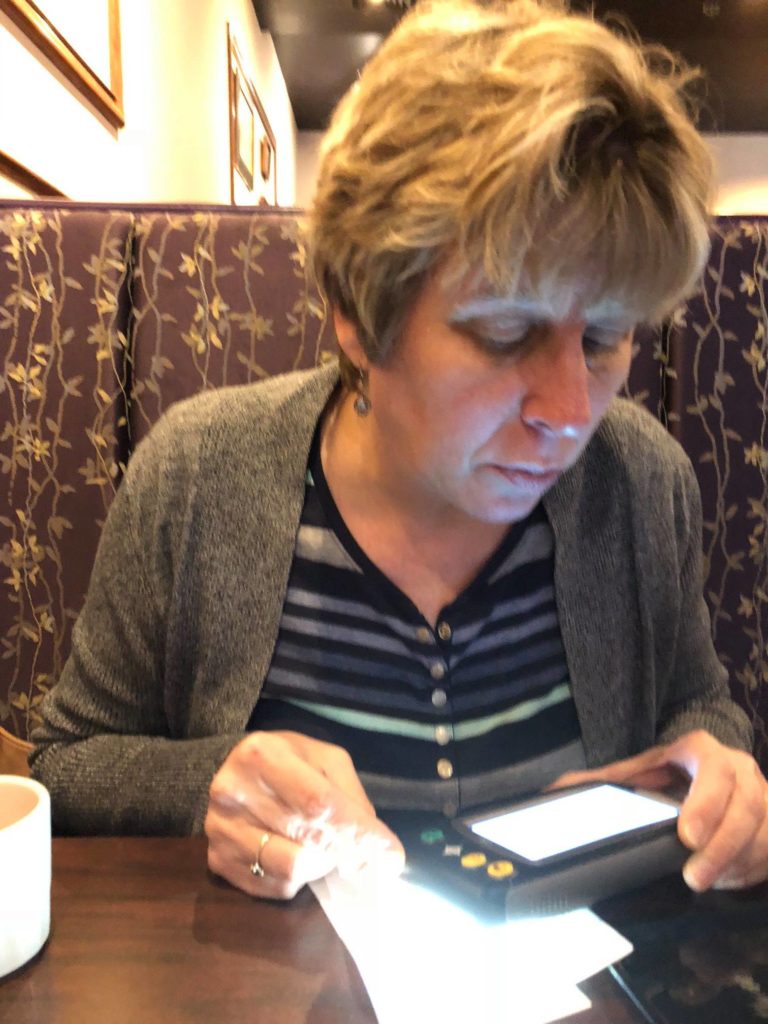I guess the most surprising thing to me about living with low vision is the fact that it can be done. That vision loss is not, as I once believed, the end of the world, and even beyond those things…to accept the wild notion that happiness is possible. It has been over 20 years now since I first received the diagnosis of a retina disease resulting in central vision loss.
Diagnosis: Degenerative Myopia
My condition is an uncommon form of nearsightedness called Degenerative Myopia. It is similar to age-related macular degeneration (ARMD). In both conditions, the central vision becomes blurry while the peripheral vision remains intact. So, while I can still walk around with relative ease, the loss is significant and permanent and has greatly changed my life. I found myself in my mid-thirties trying to process the diagnosis of blindness. What an unimaginable shock! This was not what I expected. I had just graduated from college and hoped to continue in my writing career at the local newspaper. Naturally, I felt crushed. I didn’t know how to proceed. Hopelessness—along with other ugly feelings—threatened to sink my spirit.
The Grieving Process
I won’t sugarcoat reality. Vision loss ended a way of life. For me, that meant no more driving or seeing faces clearly. No more writing and proofreading work at the paper. All detail and distance vision became impossible, but life went on. I didn’t want these changes, but there they were. Somehow, I had to mentally adapt. People talk about the grieving process, and I discovered it was real. I went through all the stages of denial, anger, bargaining, and depression before finally landing on acceptance. When it comes to grieving a loss, you don’t march neatly through all the negative emotions, dust your hands off, and announce, “I’m better now.”
There is a lot of bouncing around within the stages. You may seesaw between anger and depression, for example. Bargaining with God is common. Some days might seem pretty bleak. But as long as you never give up completely, and your overall trend is toward progress, there really is hope at the end of the tunnel. Looking back, I can see several factors that contributed to my ability to adapt to low vision.
My Five Best Ideas for Coping

1. Pace Yourself—This advice applies practically to tasks (like bill paying or cooking) that will take longer than they used to. It also applies to emotions. Vision loss is a major life change, and hitting the pause button is certainly in order. You may not know immediately how to proceed, but time and experience will guide you.
2. Experiment—Many low-vision devices exist to help with the challenges of central vision loss. Magnification is a BIG help (pun intended), and some lighted magnifiers are portable. They make reading prices in stores and on menus doable again. You will feel empowered to regain some of your independence. There are lots of different magnification devices available for low vision online but it is best to start by consulting with a low-vision specialist.
3. Find the Humor—Just recently my daughter and I went to an Italian restaurant. Upon leaving, I grabbed two small foil packets near the edge of the table. I got in the car and offered her what I assumed were hand wipes. “Don’t open those in the car,” she said. “It’s parmesan cheese.” We shared a good laugh, and I chalked it up to my eyes once again. Situations like that frequently occur with low vision, but it’s okay. Sighted people make mistakes, too.
4. Invest in Your Faith—My walk with God deepened as a result of vision loss. It helped me to realize that everything in this life is temporary. I could not change my situation, but I did change my attitude. This simple, familiar prayer sums it up well: “God, grant me the serenity to accept the things I cannot change; Courage to change the things I can; And wisdom to know the difference.”
5. Stay Connected—Linking up with other people who are visually impaired either online or in person will help you feel understood. It also may give you ideas for practical living and recreational activities as well as how vision rehabilitation services can help you cope. Also, don’t forget to stay connected to your interests as well. My love of reading now takes the form of large-print or audio books. Although my vision has changed, my love of stories has not! As far as writing goes, I now use an iPad with text enlargement, instead of pen and paper. The lighted screen and bigger print work for me. While this definitely takes more time and patience, I find it rewarding to share my experience with others. Giving people hope after vision loss means I have moved beyond acceptance to finding purpose. It is just another surprising turn on my vision loss journey.
Additional Information on Coping with Low Vision
Hadley Low Vision Series